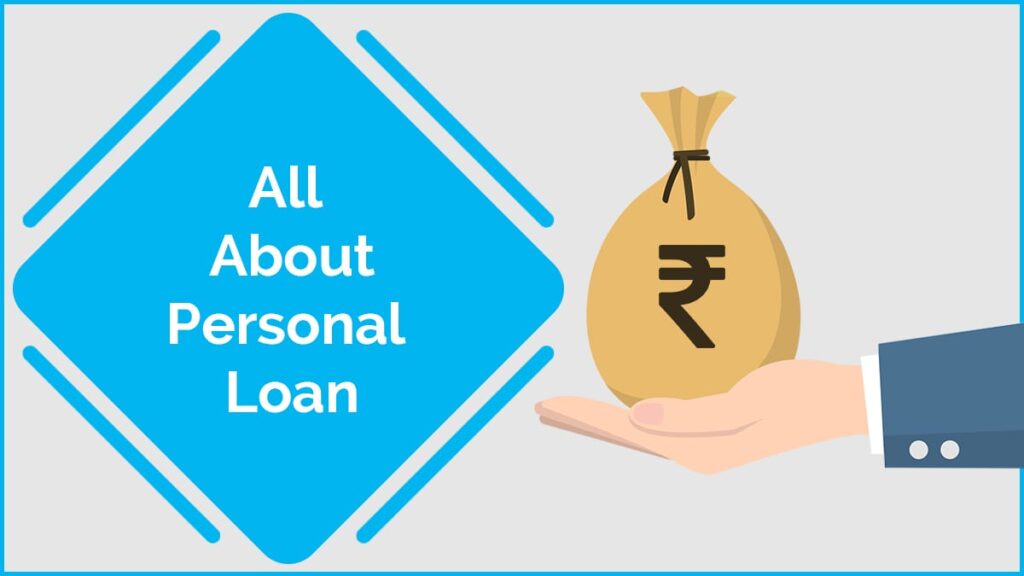Today we find a large number of people taking the benefit of personal loans for different monetary purposes. Personal loans provide them the freedom to engage in expensive purchases and pay for the price through easy EMI (equated monthly installment) options.
Personal loans come in handy to bail out any fiscal deficiency during the purchase of a car, a home, child’s higher education, an extra certificate course, a medical emergency, or any other shortfall. Many people take personal loans during the time of their children’s marriage to make it an extravagant affair. Personal loans are also useful to pay off outstanding bank loans.

Table of Contents
What is Personal Loan?
In simple terms, a personal loan is defined as an unsecured loan delivered by a bank or non-banking financial company (NBFC) to fulfill an individual’s personal fiscal requirements. The loan is given out on the basis of certain important conditions like repayment capacity, employment history, credit score, and income level.
The personal loan is different from other loans like the car loan or home loan because it is given out without securing any property. Usually, at the time of a loan sanction the loaning body keeps certain security like a property or gold so that in the instance of a default, the financial body could auction the collateral and get back the loaned amount. In personal loans since there is no collateral, hence, its interest rates are much higher than other loans keeping in view the supposed risk.
Still, it is a good idea to pay off the loan and not default on it as it would adversely affect your credit score and this would be problematic when you apply for any future loans or even for a credit card.
Benefits of Availing Personal Loan
There are several benefits of having a personal loan. For starters, you have the freedom to use this loan in any manner that you like and there would be no monitoring by the bank on its proposed use. You can avail of personal loans for a number of purposes such as an overseas trip, wedding expenses, home renovation, children’s education, purchase of home appliances or electronic gadgets, or even to fulfill the sudden medical expense. You can also use personal loans for business investment, home down payment, or to fix a car.
The application of a personal loan is a hassle-free process and you can apply for it directly on your bank’s website or at the ATM. You can also make a personal visit to the bank to make an application for a personal loan or take the help of a loan to assist app to get this loan. The process entails very few documentations and you could get a loan anywhere from a few seconds to about 4 to 5 hours.
Eligibility for the Loan
Different banks and NBFC bodies have different criteria for approving a personal loan. Still, in general, the loaning body looks at your age, your job, your current earning, your place of residence, and most importantly, your ability to make the loan repayment.
Hence, to be eligible for this loan, you should have a regular source of earning. The company where you work is also an important denominator for approving personal loans. You must also have a good credit history.
Loan Duration
You have the flexibility to apply for a loan for any duration that suits you. Usually, a personal loan is payable in 1 to 5 years. There are instances of shorter and longer tenures, but they are occasional and restricted to special cases.
Documents Required
Personal loan sanction requires minimum documentation. However, different fiscal bodies ask for different papers. Some of the essential documents sought by most financial institutions are as under.
- The proof of earning (In the case of an employed individual, the bank or NBFC body would ask for a salary slip. In the case of a self-employed, the financial institution looks for a recent acknowledged ITR)
- Document for Address Validation
- Document for Identity Validation
- Certified Copies of Degrees or License (whichever is applicable)
How much Personal Loan can I get?
The amount of personal loan that you can get is dependent on a number of factors such as your average monthly earning, your profession, and your credit score. Banks sanction loan on your capacity to pay it back. So, the amount of personal loans that you are eligible for depends on your earning and also on your employment status. In general, the loan is sanctioned such that the EMI value is less than 40 to 50 percent of your average monthly earnings.
Next, the bank looks into any current loans that you may have. If you are a self-employed person, then the loan amount is ascertained as per the profit according to the latest acknowledged profit/loss statement. The loaning body also considers all added liabilities (like an existing business loan) that you may have.
Is There Any Minimum Personal Loan Amount?
All the loaning bodies have set-up their minimum boundary for personal loan which is around Rs 30,000.
What are a bank’s criteria to decide on the maximum loan account?
Different financial bodies have their individual criteria to decide on the maximum loan amount. Nevertheless, the important constraints that seem to be common to all the banks are your existing earning, your liabilities, and your credit score. If your credit score is high and near the 900 range, then it signifies that you have successfully paid off your earlier credit card dues along with all outstanding loans, and is therefore a safe candidate for future loan amounts. This would ensure your credibility for a high loan value.
Conversely, if your earning is low or you have a high liability (in the form of existing EMIs, unpaid loans, and outstanding credit card dues), then you would be approved for a lower personal loan amount.
Is Low EMI a Good Option to Get a Loan?
A low EMI generally means a low interest rate, a long repayment duration, or both of these. Hence, in certain circumstances, you might pay greater interest on your personal loan if you go for the low EMI option. Thus, prior to selecting a bank for a personal loan, take the help of online tools like the personal loan EMI calculator to know your repayment capacity and the interest payable over the loan duration.
Can I Apply for a Joint Loan with a Family Member?
You could easily apply for a personal loan along with a family member such as your spouse or a parent. A loan co-applied with a family member raises your eligibility criteria to get processed as it is considered to be in an increased income bracket which takes into account both your earning and the earning of your family member (who has applied for it along with you). Conversely, the chances of the loan approval go down if your relative (co-applicant) has a poor credit history.
Interest Rates on Personal Loan
Since personal loans are unsecured, hence, they demand a greater interest rate in comparison to the secured loans such as a car loan or a gold loan. Currently, numerous NBFCs and banks provide personal loans at interest rates as less as 11.49%. The interest rate on a personal loan is dependent on many factors like repayment duration, loan value, monthly earning, and credit score. Your relationship with the lender also affects your interest rate.
Loan Repayment
You can repay the loan through PDCs (post-dated cheques) drawn in favour of the lending body, or by EMIs by approving a mandate to allow Electronic Clearing Services (ECS) payment.
Can I Prepay the Loan?
You can definitely prepay the loan. Still, certain banks permit prepayment only after you have made a specific number of repayments. There are still some lending bodies that disallow fractional prepayment. Moreover, you may have to pay a small prepayment/ foreclosure charge on the outstanding loan value. This fine is generally in the range of 1 to 2 percent of the outstanding principal value, while few loaning bodies even charge more.
What if I Fail to Repay?
In the instance of a failed loan repayment, the lending body would initially try to extract the due value via recovery agents and settlements. In case, you are still unable to pay off the loan then you would get a ‘default’ marked on your loan account, and this loan would be visible as default on your credit report. This would have a negative effect on your credit score and you would find it very difficult to get any future loan or a credit card approval.
Tax Benefits of Personal Loan
Personal loans by themselves don’t have any tax benefits. Still, if the loan is for a home down payment or renovation, then there might be tax benefits under Section 24. It must be remembered that this tax benefit is enjoyed on the interest amount only while the principal value is exempted from any such benefits. To avail of the deduction, you must submit the proper papers.
Can I make a Balance Transfer?
You can transfer the balance from one bank to another after the new lending bank pays off the remaining balance to the current one. After the process of a balance transfer is completed, you would now owe the remaining amount along with the interest rate to the new lender. A balance transfer allows you to enjoy the low rate of interest of the new lender. Still, you need to keep in mind certain costs of this transfer like prepayment charges and balance transfer fees.
I’m Shiv Kumar, a graduate with a passion for finance, marketing, and technology. My journey into finance started with a desire to understand money management and investing.
Our main goal is to empower individuals through financial education. We believe that everyone should have the opportunity to build a strong financial foundation. Whether you’re a seasoned investor or just getting started, we provide articles, guides, and resources to help you navigate the financial landscape.
I invite you to join our community of financially savvy individuals. Feel free to ask questions, engage with our content, and explore the topics that matter to you. Together, let’s take control of our financial futures.




